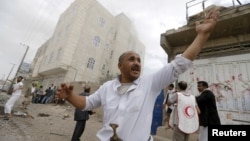A state-run media outlet in Iran is reporting that Iranian navy ships have left for waters near Yemen, amid a Saudi-led airstrike campaign to halt the advance of Iranian-backed Shi'ite rebels in the country.
Iran's Press TV on Wednesday quoted Rear Admiral Habibollah Sayyari as saying the fleet would provide safety for "Iran's shipping lanes" and protect the country's "interests in the high seas."
Sayyari also said Iran's navy would seek to keep commercial ships safe from pirates.
The fleet, which includes a destroyer and another vessel, is sailing to the Gulf of Aden and the Bab al-Mandab Strait, the main access point to the Red Sea for ships going to the Suez Canal.
Egypt has also sent naval vessels to waters off the Yemeni coast.
Tensions are high in Yemen because of the conflict between Houthi rebels and forces loyal to the country's internationally backed president, Abd-Rabbu Mansour Hadi.
Rebel fighters and troops loyal to former President Ali Abdullah Saleh, who was ousted in 2011, have been trying to capture Aden, one of the last strongholds of forces backing Hadi.
According to the World Health Organization, 643 people have been killed and 2,226 wounded in the fighting in Yemen.
The medical humanitarian organization Doctors Without Borders (MSF) said Wednesday that a five-person emergency surgical team and urgently needed medical supplies had arrived at the port city of Aden.
The 1.7 tons of medical supplies arrived from Djibouti and will be used to treat large numbers of wounded people at the hospital run by the aid group.
The United Nations Children's Fund (UNICEF) said Tuesday's airstrike on a school in Yemen's Ibb province "is a stark reminder of the appalling risks facing children as the conflict in Yemen intensifies." The airstrike killed at least two children and wounded two others.
UNICEF said at least 77 children have been killed in the conflict.
In other news, the European Aviation Safety Agency banned carriers from France and the United States from Yemeni airspace due to safety concerns.
US: AQAP making gains
Earlier Wednesday, U.S. Defense Secretary Ashton Carter said al-Qaida's branch in Yemen is taking advantage of fighting between Houthi rebels and pro-government forces to seize territory in the country that has struggled for stability since its former leader was ousted in 2011.
Carter told reporters during a visit to Japan that the crisis in Yemen has made U.S. efforts to counter al-Qaida in the Arabian Peninsula [AQAP] more difficult, and that such operations are easier when there is a stable government.
"The terrorism threat to the West, including the United States, from the AQAP is a long-standing and serious one," Carter said. "That one we will keep combating. We obviously will change the way we do that in accordance with the circumstances there.
"Obviously, we hope that order is restored to Yemen, not only for that reason, but because there's a lot of suffering going on in Yemen as these fluid battles and these different groups go back and forth," he said.
Carter also said the U.S. is providing Saudi Arabia with intelligence, surveillance and reconnaissance information to help the coalition of forces battling the Houthis.
Carter, on his first visit to Asia as defense secretary, is scheduled to travel to South Korea later this week.
On Tuesday, U.S. Deputy Secretary of State Antony Blinken said the government is speeding up weapons deliveries to the alliance as well.
Warplanes from Saudi Arabia and Arab allies have been striking Shi'ite Houthi rebels, who have been fighting forces loyal to Hadi.
Rights groups' concerns
Human Rights Watch also urged Houthi leaders to investigate allegations that rebel fighters used excessive force during two demonstrations in southern Yemen.
The group said Tuesday that Houthi fighters and government security forces fired on protesters who were demonstrating against the Houthis. The separate incidents in Taizz and al-Turbba killed seven people and wounded 83 others, HRW said.
The rights organization also called attention to what it said is the increasing use of excessive force and arbitrary arrests of protesters and journalists.
Meanwhile, United Arab Emirates Foreign Minister Sheik Abdullah bin Zayed accused Iran of meddling in Yemen’s conflict and elsewhere in the region Wednesday, adding that the Gulf Arab states had little grounds for hoping they could build normal ties with Tehran.
Sheik Abdullah said a Saudi-led coalition now attacking Iranian-allied Houthi fighters in Yemen wanted a U.N. Security Council resolution requiring all parties to take part in dialog and imposing a ban on arms purchases by Houthis and other groups “that are out of line.”
Sunni Muslim Gulf Arabs could have “positive, normal” ties with Tehran, he said, “but Iran is not giving its partners in the region this hope. ... Each time we try to come close to Iran it starts spoiling the region, making (matters) difficult for our countries," he said.
Iran denies arming the Houthis and has condemned the Saudi-led offensive against the Houthis of which the UAE is a part.
Also, Al-Qaida offered a bounty of 20 kilograms (44 pounds) of gold for the capture or killing of Abdel-Malek al-Houthi, the leader of Yemen's Houthi forces, and his ally, former President Saleh, the SITE monitoring group said Wednesday. The offer was made in a video distributed by al-Qaida's media arm, SITE said.
Some material for this report came from Reuters.




